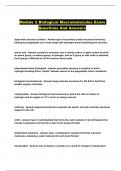Biological macromolecules - Study guides, Class notes & Summaries
Looking for the best study guides, study notes and summaries about Biological macromolecules? On this page you'll find 1619 study documents about Biological macromolecules.
All 1.619 results
Sort by
 Popular
Popular
-
Testbank for Biology 2nd Edition from OpenStax College
- Exam (elaborations) • 57 pages • 2023
-
- $17.99
- 4x sold
- + learn more
Testbank for Biology 2nd Edition from OpenStax CollegeChapter 1 1 Figure 1.6 1: C; 2: F; 3: A; 4: B; 5: D; 6: E. The original hypothesis is incorrect, as the coffeemaker works when plugged into the outlet. Alternative hypotheses include that the toaster might be broken or that the toaster wasn't turned on. 3 Figure 1.16 Communities exist within populations which exist within ecosystems. 4 B 6 D 8 C 10 C 12 B 14 D 16 Answers will vary, but should apply the steps of the scientific method. One poss...
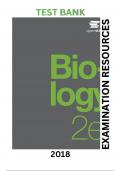 Popular
Popular
-
Test Bank for Biology 2e by OpenStax by Mary Ann Clark Texas Wesleyan University (Author), Jung Choi Georgia Polytechnic University (Author), Matthew Douglas Grand Rapids Community College (Author) - Complete, Detailed and Latest Test Bank. Chapter 1 incl
- Exam (elaborations) • 10 pages • 2024 Popular
-
- $18.50
- 3x sold
- + learn more
Test Bank for Biology 2e by OpenStax by Mary Ann Clark Texas Wesleyan University (Author), Jung Choi Georgia Polytechnic University (Author), Matthew Douglas Grand Rapids Community College (Author) - Complete, Detailed and Latest Test Bank. All Chapters (1-47) included. #StudyChemistry #LearnBiology #CellBiology #Genetics101 #EvolutionStudies #BioDiversity #PlantBiology #AnimalBiology #BiologyEssentials #ScienceEducation #BiologyStudents #TestPrep #ExamResources #BiologyExamPrep ...
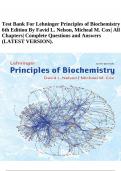
-
Test Bank For Lehninger Principles of Biochemistry 6th Edition By Favid L. Nelson, Micheal M. Cox| All Chapters| Complete Questions and Answers (LATEST VERSION).
- Exam (elaborations) • 273 pages • 2023
- Available in package deal
-
- $24.99
- 2x sold
- + learn more
Test Bank For Lehninger Principles of Biochemistry 6th Edition By Favid L. Nelson, Micheal M. Cox| All Chapters| Complete Questions and Answers (LATEST VERSION). Chapter Chapter 1 1 The Foundations Foundations of of Biochemistry Biochemistry Multiple Choice Questions 1. Cellular foundations Cellular foundations Pages: 33-4 DDiffffiicculttyy: 11 Anns: : CC In a bacterial cell, the DNA is in the: A) cell envelope. B) cell membrane. cell membrane. C) nucleoid. D) nucleus. E) ribosomes. ri...
Module 2 Biological Macromolecules Exam Questions And Answers...
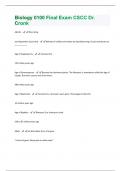
-
Biology 0100 Final Exam CSCC Dr. Cronk Questions And Answers Rated A+
- Exam (elaborations) • 10 pages • 2024
- Available in package deal
-
- $7.99
- 1x sold
- + learn more
Abiotic - Non-living acid deposition (acid rain) - Release of sulfate and nitrate during theburning of coal contributes to ___________ Age of Angiosperms - Cenozoic Era 125 million years ago Age of Gymnosperms - Became the dominant plants. The Mesozoic is sometimes called the Age of Cycads. But their success was short-lived. . 390 million years ago Age of Mammals - Cenozoic Era- dinosaurs were gone. They began to flourish 65 million years ago Age of Reptiles - Mesozoic Era- dinosaurs r...
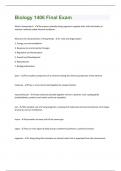
-
Biology 1406 Final Exam | 715 Questions and Answers(A+ Solution guide)
- Exam (elaborations) • 68 pages • 2023
- Available in package deal
-
- $13.49
- 1x sold
- + learn more
What is homeostasis - the process whereby living organisms regulate their cells and bodies to maintain relatively stable internal conditions What are the characteristics of living things - 1. Cells and Organization 2. Energy use and metabolism 3. Response to environmental changes 4. Regulation and homeostasis 5. Growth and Development 6. Reproduction 7. Biological Evolution atom - the smallest component of an element having the chemical properties of the element molecule - Two or more ...
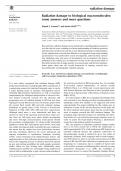
-
Radiation damage to biological macromolecules: some answers and more questions
- Exam (elaborations) • 6 pages • 2024
-
- $15.49
- + learn more
Radiation damage to biological macromolecules: some answers and more questions Elspeth F. Garmana * and Martin Weikb,c,d,e* a Laboratory of Molecular Biophysics, Department of Biochemistry, University of Oxford, South Parks Road, Oxford OX1 3QU, UK, bComissariat a` l’Energie Atomique, Institut de Biologie Structurale, F-38054 Grenoble, France, cCNRS, UMR5075, F-38027 Grenoble, France, dUniversite´ Joseph Fourier, F-38000 Grenoble, France, and e ESRF, 6 rue Jules Horowitz, BP 220, 380...
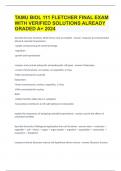
-
TAMU BIOL 111 FLETCHER FINAL EXAM WITH VERIFIED SOLUTIONS ALREADY GRADED A+
- Exam (elaborations) • 36 pages • 2023
- Available in package deal
-
- $14.99
- 1x sold
- + learn more
describe the basic functions all life forms must accomplish -response to environmental stimuli & maintain homeostasis -uptake and processing of nutrients/energy -regulation -growth and reproduction compare and contrast eukaryotic and prokaryotic cell types Prokaryotes: -circular chromosomes, no nucleus, no organelles, 3.5 bya -DNA concentrated in nucleoid Eukaryotes: -linear chromosomes, nucleus, organelles, 1.5 bya -DNA concentrated in nucleus Both: -cellular function takes p...
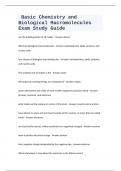
-
Basic Chemistry and Biological Macromolecules Exam Study Guide
- Exam (elaborations) • 32 pages • 2023
- Available in package deal
-
- $8.49
- + learn more
are the building blocks of all matter - Answer-Atoms What are biological macromolecules - Answer-carbohydrates, lipids, proteins, and nucleic acids. four classes of biological macromolecules - Answer-carbohydrates, lipids, proteins, and nucleic acids The smallest unit of matter is the - Answer-atom All living and nonliving things are composed of - Answer-matter atoms themselves are made of even smaller subatomic particles called - Answer- protons, neutrons, and electrons what makes up the ...
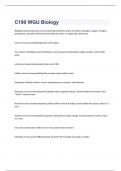
-
C190 WGU Biology exam 2023 with 100% correct answers
- Exam (elaborations) • 8 pages • 2023
-
Available in package deal
-
- $13.49
- 1x sold
- + learn more
Biological macromolecules formed when atoms of carbon, hydrogen, oxygen, nitrogen, phosphorus, and other elements bond with each other in unique and varied ways Atom building blocks of all matter four classes of biological macromolecules carbohydrates, lipids, proteins, and nucleic acids cell fundamental, basic unit of life Matter anything that occupies space and has mass Subatomic Particles of Atom protons, neutrons, and electrons Electrons Subat...
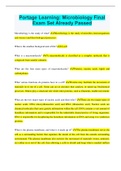
-
Portage Learning: Microbiology Final Exam Set Already Passed
- Exam (elaborations) • 40 pages • 2022
- Available in package deal
-
- $10.49
- 19x sold
- + learn more
Portage Learning: Microbiology Final Exam Set Already Passed Microbiology is the study of what? Microbiology is the study of microbes (microorganisms and viruses) and their biological processes. What is the smallest biological unit of life? A cell What is a macromolecule? A macromolecule is classified as a complex molecule that is composed from smaller subunits. What are the four main types of macromolecules? Proteins, nucleic acids, lipids and carbohydrates What various functions do protein...
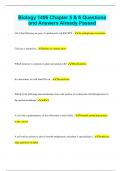
-
Biology 1406 Chapter 5 & 6 Questions and Answers Already Passed
- Exam (elaborations) • 3 pages • 2024
- Available in package deal
-
- $8.99
- 1x sold
- + learn more
Biology 1406 Chapter 5 & 6 Questions and Answers Already Passed All of the following are part of a prokaryotic cell EXCEPT... An endoplasmic recticulum Cell size is limited by... Surface to volume ratios Which structure is common to plant and animal cells? Mitochondrion In a bacterium, we will find DNA in... The nucleoid Which of the following macromolecules leaves the nucleus of a eukaryotic cell through pores in the nuclear membrane? mRNA A cell with a predominance of free ...

How much did you already spend on Stuvia? Imagine there are plenty more of you out there paying for study notes, but this time YOU are the seller. Ka-ching! Discover all about earning on Stuvia

